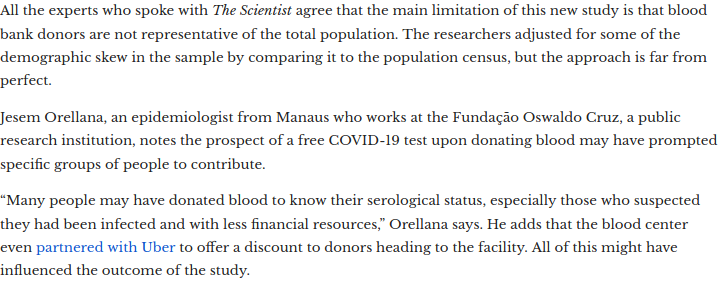This thread from December pointed out that convenience samples are not suitable for any but the coarsest estimates of prevalence, and that the popularity of a prevalence study like this can be driven more by its status as an outlier than by its quality.
1/ https://twitter.com/WesPegden/status/1336801382955933697
1/ https://twitter.com/WesPegden/status/1336801382955933697
At the time I did not give specific examples of confounders one might expect using blood donors (because I wasn't sure what the important ones would be!).
2/
2/
Later, though, this piece was published, quoting a local epidemiologist pointing out that *free COVID testing was offered as an incentive for donation* (h/t @therealrthorat). This is a very problematic confounder which is not discussed in the paper. 3/
https://www.the-scientist.com/news-opinion/study-estimates-76-percent-of-brazilian-city-exposed-to-sars-cov-2-68272
https://www.the-scientist.com/news-opinion/study-estimates-76-percent-of-brazilian-city-exposed-to-sars-cov-2-68272
Inferring causation from correlation or prevalence from nonrandom samples is inherently fraught regardless of whether we can correctly guess at specific possible confounders. This example shows the ways in which our imagination can fail.
This piece has another lesson also: 4/
This piece has another lesson also: 4/
The popularity of the study (a prevalence study on blood donors published in Science!) certainly seemed tied to its role in debates about HITs and attack rates. It might be easy to see the study as being in service of a noble cause in an important dispute. 5/
But locally, in Manaus, the study had exactly the opposite effect; local epidemiologists there blame the study for contributing to misplaced optimism about herd immunity from the first wave of the epidemic, and making the case for further pandemic response more difficult. 6/
So much science in the pandemic has been filtered through the lens of preconceived notions about effects on policy.
But scientists have not been good at this. It may be better to stick to just trying to understand the truth as well as possible. 7/7
But scientists have not been good at this. It may be better to stick to just trying to understand the truth as well as possible. 7/7

 Read on Twitter
Read on Twitter


